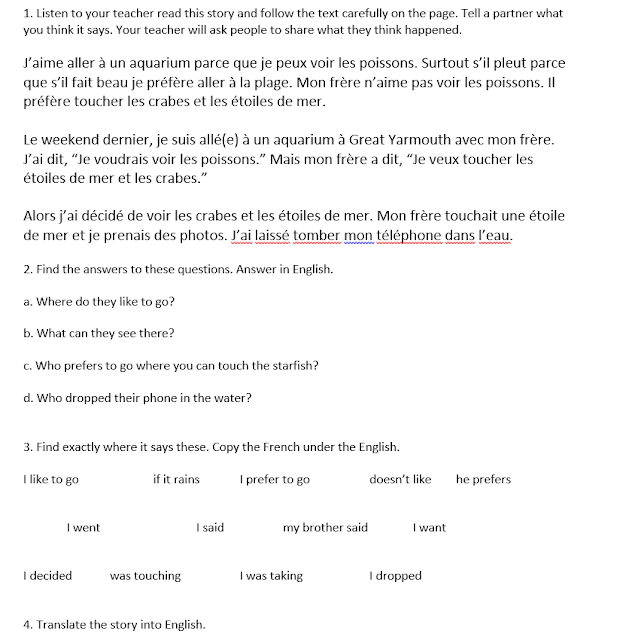We left Part 2, with the pupils happily riffing on any infinitives you care to give them, spontaneously developing answers with opinions, reasons and if sentences, working on making their answers coherent and realistic. And we promised a story about a terrible combination of roller-coasters, sweets and fizzy pop. We'll get there!
We are up to page 7 of the booklet. And we are going to start adding tenses to the repertoire of opinions and reasons. First of all we do this with some past tense cheats.
We are still on the topic of La Plage, and the pupils have the next iteration of the Beach Keep Talking Sheet. This time with I was going to, I said, He/She said, the weather was..., and I decided to... As you can see from the little anecdote above, these cheats can be very effective in developing answers into little stories.
Pupils work using this template, modifying the story using different infinitives:
Again, some of the work is listening to the teacher, spotting the changes in the text. Then the pupils produce their own answers, maybe starting slow, carefully and in writing. But the aim is for them to be able to riff on any infinitives they are given, using their template to create spontaneous answers.
We are going to move on from the "cheats" to using verbs in the imperfect and the perfect. The imperfect doesn't work on its own. Just as I was going to... is followed by but I decided to..., so any verb in the imperfect (I was swimming...) is followed up with but something happened.
Pupils have seen the imperfect separately for describing what somone was wearing. And the perfect for saying what they did at the weekend or in the holidays. But here they are being used together to create narrative. So we work on spotting one from the other, and then have lots of examples where pupils are reading or listening to stories modelling how they are used:
Pupils work on identifying the verbs and identifying the meaning, before substituting other verbs into the story. At this stage, they are given the verbs conjugated in the infinitive and in the two past tenses, so they are selecting the correct form to replace the verb in the original story.
And now we are ready for some more stories. At this stage they are models given to them in French so they can concentrate on meaning, on the form, and on how the models are constructed.
First this one:
And then the famous roller-coaster story:
In Part 4 we will move onto pupils manipulating the tenses and creating their own stories...






No comments:
Post a Comment